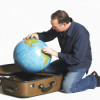
Are you planning for international travel soon? It is crucial to have a clear understanding of health precautions necessary to keep you safe during your trip. Consider the tips and guidelines in this article for a healthy and safe travel experience.
Importance of Health Preparations for International Travel
Proper health precautions can mean the difference between a trip that is memorable for all the right reasons, and one that you'd rather forget due to health mishaps. Being informed about the appropriate vaccines, having the necessary prescriptions, understanding food safety abroad, and knowing how to prevent mosquito-borne diseases should be part of your pre-travel preparation. With adequate preparation, you can mitigate health risks and enjoy your trip with peace of mind.
Getting the Necessary Vaccinations for Your Destination
Vaccinations are a key aspect of travel health as they protect you from diseases prevalent in certain regions. Check with your healthcare provider or a travel medicine specialist about the recommended or required vaccines for your destination, such as Yellow Fever, Hepatitis, Typhoid, or Meningitis. Be ready to provide your vaccination history and any existing health conditions. To ensure timely immunological response, have your shots 4-6 weeks prior to your departure.
Know your Health Insurance Coverage Internationally
Understanding the scope of your health insurance internationally is crucial, because not all insurance providers have provisions for overseas medical costs. Validate your insurance plan, and if necessary, consider acquiring additional international travel health insurance. This safeguards you against potential hefty medical bills in case you require medical assistance while abroad.
Prescription Medication and International Travel
If you have personalized prescription medication, bring an ample supply for your travel. Transportation delays or loss of luggage can leave you without your medication if you do not pack enough. Always carry copies of your prescriptions, particularly for controlled substances and injectables, as customs might require proof that the drugs are prescribed to you.
Understanding Food and Water Safety Precautions
Food and water can be sources of bacteria, viruses, or parasites, especially in countries where hygiene standards might differ from your home country. Be mindful of your eating habits and dining choices. Stick to restaurants with high hygiene standards and avoid street food, if possible. Also, prefer bottled water over tap and avoid ice, especially in high-risk areas.
Protecting Yourself Against Mosquito-borne Diseases
Some tropical and sub-tropical areas have a high risk of mosquito-borne diseases like Zika, Dengue, Malaria, and Chikungunya. Wearing long-sleeved clothing, using insect repellents, sleeping under mosquito nets, and taking antimalarial medication can help prevent these diseases. Be informed about the risk level in your intended destination and take appropriate precautions.
Ensuring Personal Safety during Travel
While disease prevention is paramount, personal safety is equally critical when traveling internationally. Be aware of your surroundings and avoid risky areas, especially late at night. Keep your belongings secured and carry only necessary items when exploring your destination. Avoid flaunting expensive items like jewelry or cameras in public places.
















